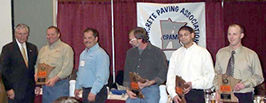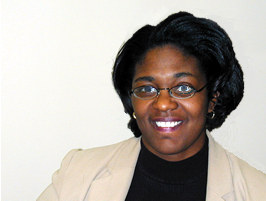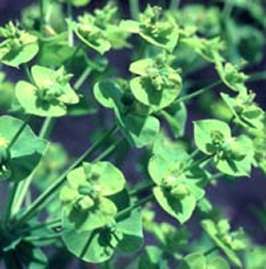 |
 |





 |
 |
 |
 |
 |
 |
Projects win acclaim from Concrete Paving Association
|
 |
 |
 |
The Mankato District
received an award from the Concrete Pavers Association for accident prevention
efforts. Accepting the award from left are Commissioner Elwyn Tinklenberg;
Kevin Oldridge and Dean Tibbetts, Southern Minnesota Construction; and
Ken Wenkel, Adam Schendel and Chad Fowlds of Mn/DOT. Photo by Gordy
Regenscheid
|
Mn/DOT’s Metro Division and the Rochester and Willmar districts earned several
awards for excellence in concrete paving from the Concrete Paving Association
of Minnesota. Award criteria include quality, rideability and project complexity.
Representatives from Mn/DOT accepted the awards on April 3 in Mankato at the
association’s annual seminar. Participants joined panels that explored issues
such as ride quality, research innovations, counties’ experience with concrete
pavements and work zone safety issues.
The association recognized superior paving performance in several areas including
urban freeways, rural highways, highway support facilities, city streets and
airports.
Mn/DOT’s awards included second place national honors for a Metro Division
project that involved an unbonded concrete overlay on 35W.
Project awards Mn/DOT earned and those accepting the awards are:
-
Highway support facility—construction of intersection of Hwy 77 and 66th
Street in Richfield with connection to newly built section of Longfellow
Avenue done in cooperation with the Metropolitan Airports Commission, Metro
Division, Emmanuel Taye, Tom Dusterhopf, J.T. Whalen and Tom Ravn.
-
Concrete overlay—I-90 eastbound from Hwy 13 to Freeborn County Road 46,
Rochester District, Mike Kempinger, James Roberts and Duane Piepho.
-
Urban divided highways—Hwy 312 (new Hwy 212) Wallace Road to Mitchell Road;
1.2 miles in Eden Prairie, outstanding quality pavement construction, Metro
Division, Mark Panek, Michael Beer, Dave Siefkes, Mark Mueske and Stan James.
-
Technical innovation—I-35W 60-year design life concrete pavement using
stainless steel dowel bars, a low water-to-cement ratio and specific aggregates,
one mile from I-494 to Hwy 62, Metro Division, Tom Ravn, Leon Lillie, Gordy
Bruhn, Ted Dusteroff and Terry Zoller.
-
Concrete pavement restoration—3.5-mile section of Hwy 52 in Goodhue County
using concrete planing after joint repair to eliminate surface irregularities,
Rochester District, Tom Meath, Gary Lovelace and Bradley Horn.
- Safety award for work in a high-traffic area—Hwy 14 in Mankato, Ken Wenkel,
Adam Schendel and Chad Fowlds.
In addition to the awards from the association, these projects and the employees
who worked on them also drew notice from Jim Swanson, assistant commissioner,
Program Delivery.
"Congratulations to all the concrete paving award winners," he said.
"It’s great to see the pride that goes into these jobs and the quality
that it produces for the driving public of Minnesota."
By Craig Wilkins
|
back

|
 |
Commissioner takes transportation funding needs to media statewide
|
 |
 |
With new transportation funding seemingly in jeopardy this session because
of a legislative deadlock, Commissioner Elwyn Tinklenberg is making a push to
raise public awareness about the need for additional transportation funding.
Talking to reporters and editorial staff from newspapers, TV and
radio stations, Tinklenberg made his message clear: Minnesota needs
a dedicated, long-term, flexible funding source for transportation
to keep up with public demand.
In his media interviews, the commissioner has cited a
number of projects as examples of what could be accomplished
with additional funding, such as moving up some highway and bridge
improvement projects by as much as 10 years.
"Inflation in the highway construction industry has been rising
at twice the rate of general inflation, so waiting to begin projects
could make them even more expensive," Tinklenberg said.
A legislative conference committee of five senators and five representatives
has so far reached no compromise on a transportation-funding bill.
The Senate’s transportation finance bill includes a six-cent per gallon gas
tax increase, indexing, establishment of a multi-modal fund, bonding
and a referendum vote for a possible one-half cent sales tax increase
in the 11-county metropolitan area. The House version has no money
for the Northstar Commuter Rail project and includes bonding for
$750 million over five years, to be paid with growth in the transportation
fund.
On April 8, the Minnesota Transportation Coalition—a group of business,
labor, local government and transportation organizations—recommended
a five-cent per gallon gas tax increase as a transportation finance
compromise.
If the Legislature fails to pass a transportation finance bill
this year, the state may lose $147 million in federal funding for
the Northstar Commuter Rail project.
The Legislature must adjourn by May 20 this year. Click here to
see Mn/DOT’s
weekly legislative summaries of transportation-related actions.
|
back

|
 |
Bouyer now diversity officer, ADA coordinator in Human Resources
|
 |
 |
 |
|
Janet Thomas Bouyer
is Mn/DOT’s new diversity/affirmative action officer as well as Americans
with Disabilities Act coordinator.
|
Janet Thomas Bouyer is Mn/DOT’s new diversity/affirmative action officer as
well as Americans with Disabilities Act coordinator.
She assumes the internal diversity responsibilities formerly performed
by the Equal Employment Opportunity/ Contract Management Office.
In her new role, Bouyer reports directly to Human Resources Director
Mark Carlson and serves as a member of Chief of Staff Margo LaBau’s
executive team.
"By establishing diversity beliefs and principles early in the recruiting,
hiring, training and professional development process, we can eliminate the
perception of diversity as an ‘option,’" LaBau said. "It is not an
option. It is plainly and simply the right thing to do.
"We are committed to making significant strides down the road of inclusion
and acceptance," she added. "I am excited to have someone of Janet’s
skill and demeanor joining my staff and helping our management team provide
the necessary leadership toward success in this effort."
Bouyer began working for Mn/DOT in 1989 as a management analyst for the Office
of Administrative Services. She also served as quality improvement trainer,
employee development specialist and diversity specialist for the former Engineering
Services. While attending law school, she worked for the Office of Consultant
Services and the Office of Human Resources Labor Relations unit. She passed
the bar exam last summer and joined the EEO/Contract Management Office in September
to work on internal diversity issues.
Diversity is a natural fit with Human Resources, Bouyer said, and will have
an integral place in all Human Resources activities, especially recruitment,
retention and development.
"We have to get better at recruiting a diverse workforce, and we need
to consider unorthodox measures to achieve this," Bouyer said. "The
census data shows clearly that our population is becoming much more diverse.
A look at our schools shows this. We as a nation are becoming much more of a
‘rainbow’ of racial diversity."
Later this month, as one of her first efforts, Bouyer will present a proposal
for Mn/DOT’s 2002 agency-wide strategic diversity plan to the Mn/DOT Diversity
Committee, whose membership includes Mn/DOT’s Senior Management Team.
"The proposal," Bouyer said, "follows an inclusionary approach
so that, as we go about our daily business, we are mindful of and will be measured
on tactics that integrate and include all of our employees. This will be especially
important in recruitment, retention and development."
Bouyer indicated that Mn/DOT will incorporate accountability measures into
performance measures for managers and offices in the very near future.
"I envision a two-way information flow," she said, "where managers
provide tools that their supervisors will need to implement the plan, while
employees have a means to provide feedback on supervisors’ effectiveness."
As ADA coordinator, Bouyer will review "requests for reasonable accommodation"
from employees with disabilities to determine if the requests will help them
work better. She will also be the contact person for other types of disability
issues.
Another responsibility Bouyer has is as a contact point for harassment and
discrimination complaints.
"If someone has a concern, they have choices about where to go to get
their concern heard," Bouyer said. Mn/DOT’s policies give several options,
depending upon an employee’s comfort and trust level. One of those options is
to call me."
Bouyer can be reached on GroupWise, by interoffice mail (Mail Stop 200) or
by phone at 651/296-1016.
|
back

|
 |
Guide to common roadside invasive plants now available
|
 |
 |
 |
Leafy spurge, pictured
above, is considered an invasive plant.
|
During the month of April, the grass turns greener, the leaves start budding
and the birds return chirping. As nature awakens, flowers will bloom all over
the state.
But beware: amidst this beauty lurks weeds, colorful invasive plants that spread
along roadsides and destroy valuable land.
"Common Roadside Invasives: A roadside field guide to showy herbaceous
weeds," is now available to help roadside vegetation managers and maintenance
staff identify and control these weeds along the roadside, according to Bob
Jacobson, transportation program supervisor for Mn/DOT’s Erosion Control Unit.
Compiled by the Federal Highway Administration, this guide identifies many different
common and showy roadside invasive grasses and forbs—such as the dandelion and
thistle—that are on various noxious weed lists statewide.
Invasive plants, otherwise known as weeds, originate in many different places
such as Europe, Russia, Asia and the United States. They become invasive when
they are brought to geographic areas where they have no natural predator. Although
many of these weeds are pretty to the eye, they pose various problems for the
land. For instance, leafy spurge, a common Russian weed, invades rangeland used
for cattle grazing. The cattle will eat everything but leafy spurge. As time
goes on, the land becomes useless as pastureland because all that remains is
leafy spurge.
Mn/DOT is required by state law to control these plants. Typically, patches
of weeds are destroyed with herbicides, but in more difficult cases weeds are
mowed.
"Spraying Canadian thistle when it is seeding won’t work well so we mow
the patches to prevent the seed from blowing around the countryside and then
spray the re-growth later," Jacobson said. "Although invasive plants
are primarily a problem that happens further inland than the roadsides, it is
important for Mn/DOT to identify and control these plants because they use roadsides
as a route to spread quickly to new regions."
For a copy of this guide, contact the FHWA at the Office of Natural Environment,
400 Seventh Street SW, Room 3240, Washington D.C., 20590, or call Bonnie Harper-Lore
at 651/291-6104. Additional information can also be found at the FHWA Web site,
www.fhwa.dot.gov/environment.
By Shayla Cain
|
back

|
 |
Severe weather back in season
|
 |
 |
 |
|
Severe Weather Week
is April 15-19. Contact your safety coordinator to learn the location
of the severe weather shelter locations at your work site.
|
Severe Weather Week is April 15-19, reports Rita Hutton, Central Office safety
administrator. Some Mn/DOT sites will conduct severe weather drills, Hutton
said. In addition, sirens will sound in participating counties statewide on
Thursday, April 18, at 1:45 p.m. and 6:55 p.m.
Employees should review the location of the severe weather shelter locations
within their work site (interior rooms and hallways away from windows). Contact
information for safety coordinators is posted by district on iHUB at http://www2.dot.state.mn.us/hr/safety/index.html.
Additional information about Severe Weather Awareness Week can be found on
the Department of Public Safety's Emergency Management Division Web page at
www.dem.state.mn.us.
|
back

|
|
 |
|



